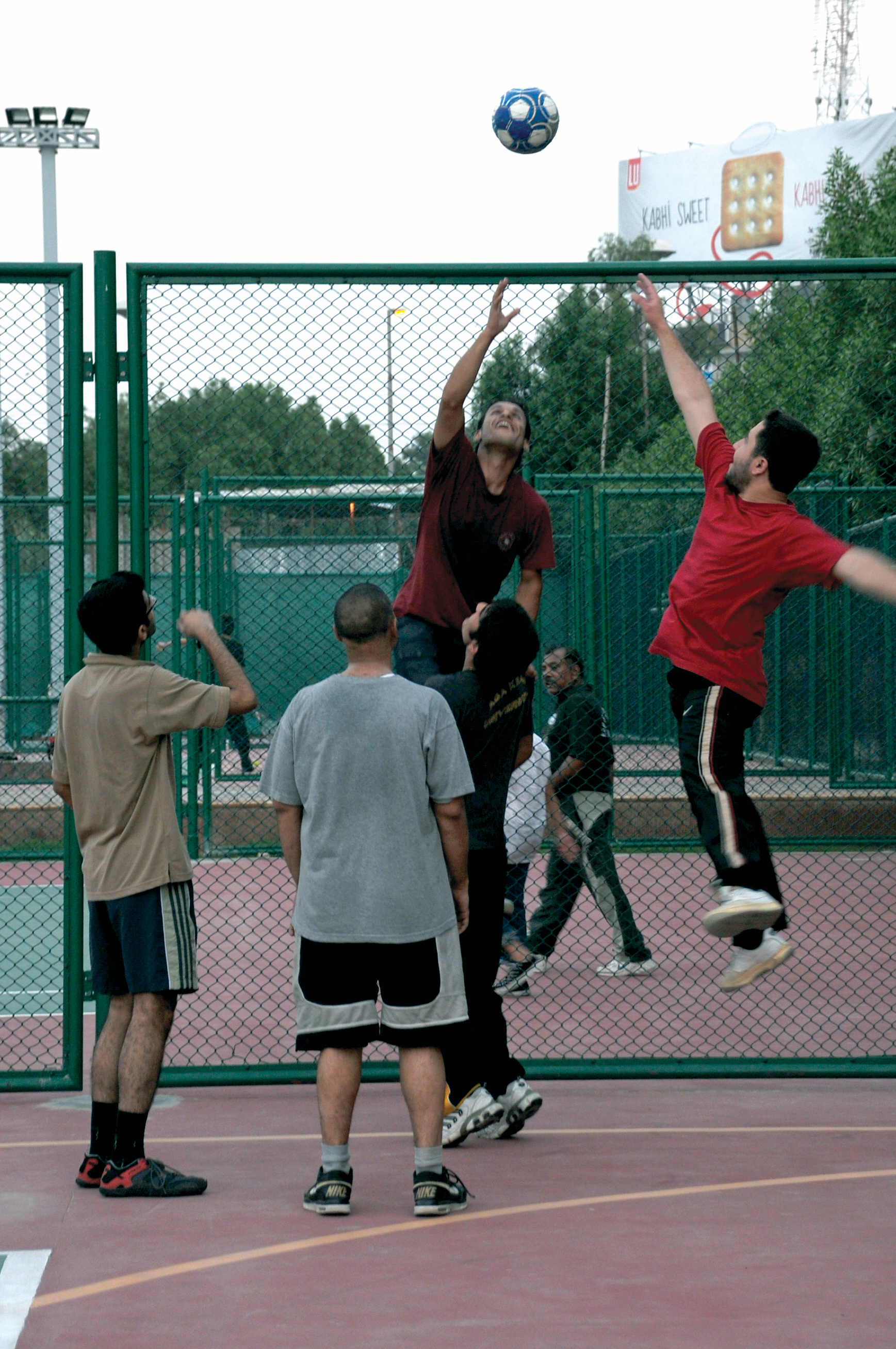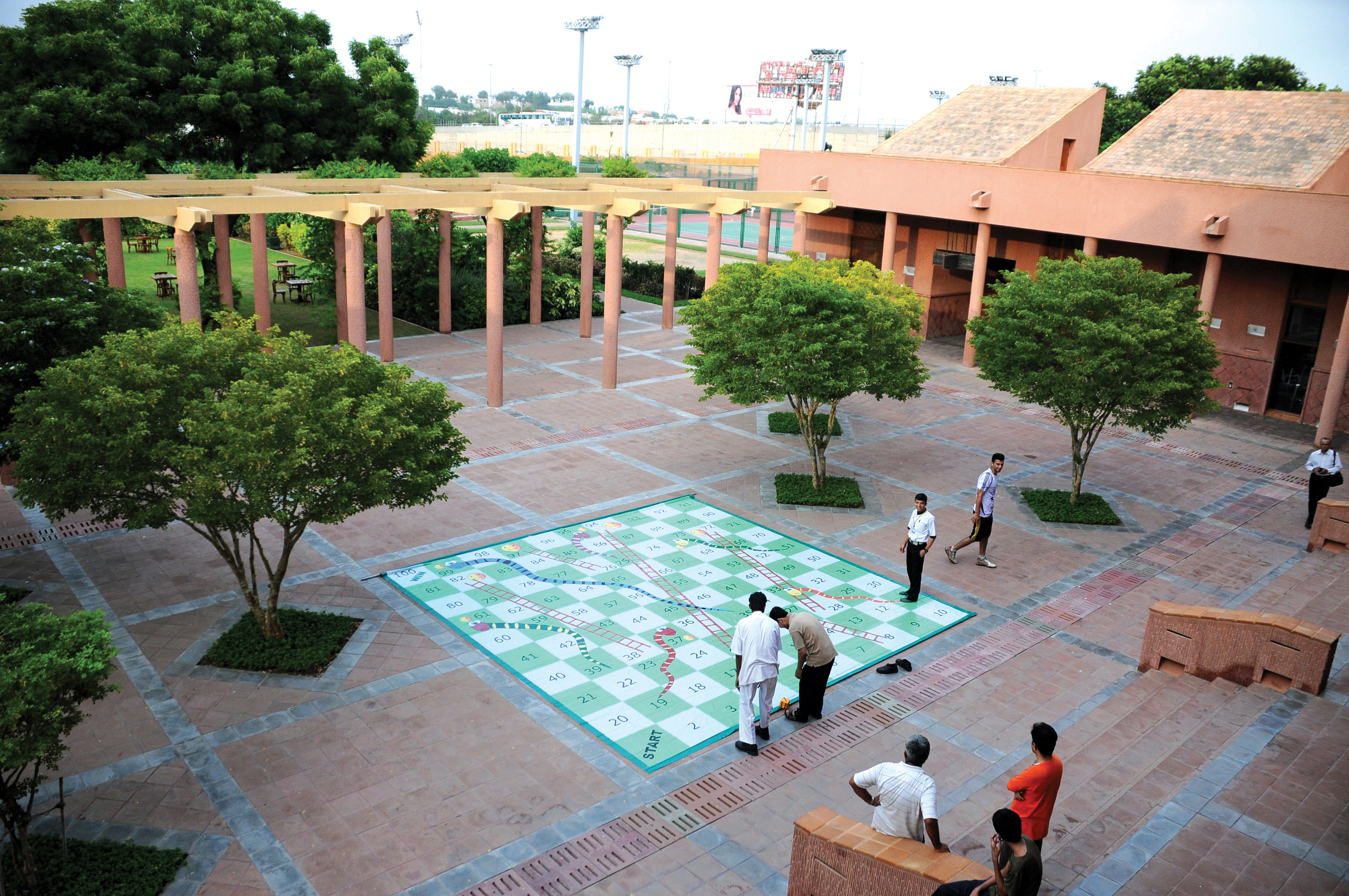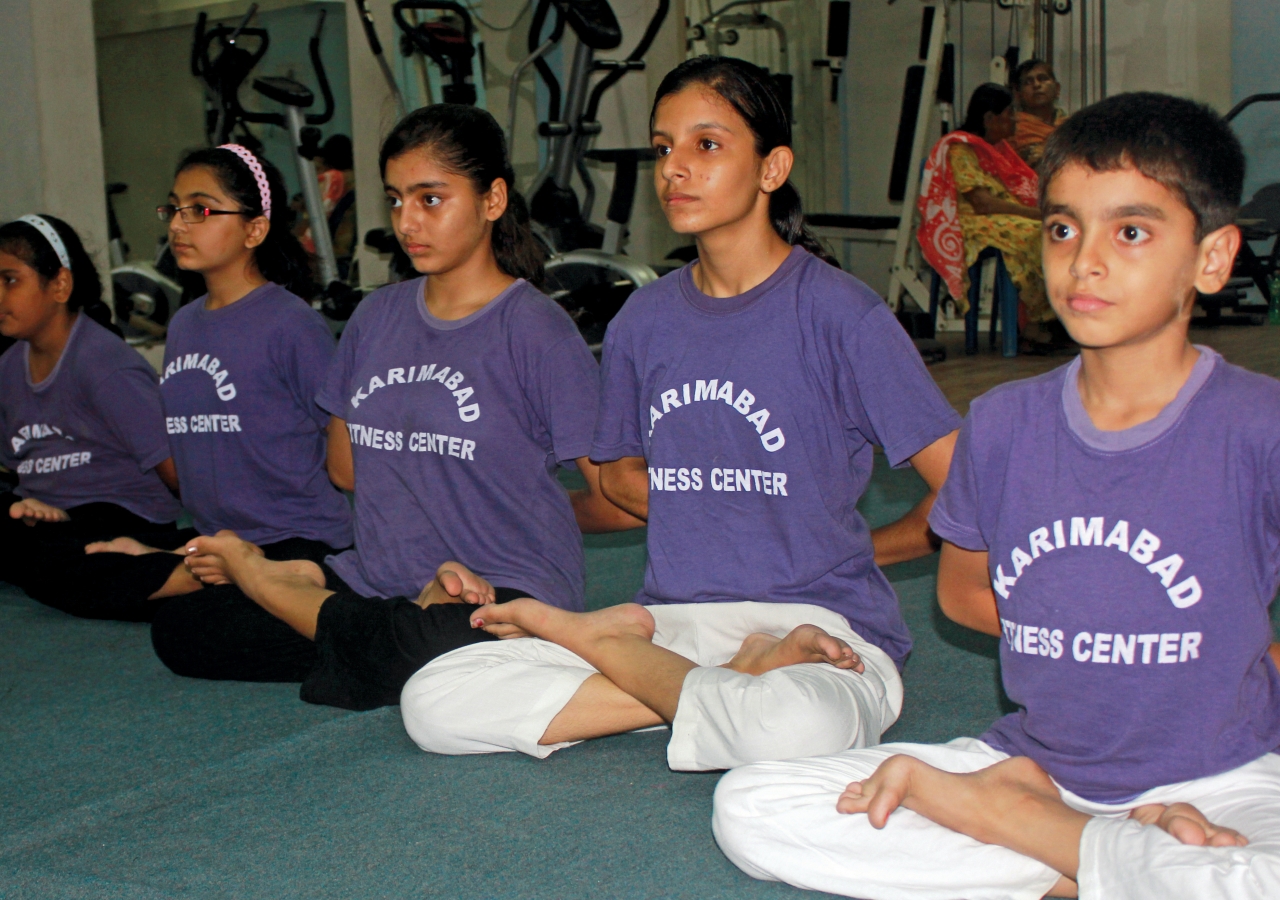If it is kite flying season in Pakistan, young boys will be seen on rooftops or in the streets flying and chasing kites. If it is cricket season – a national obsession – open grounds, parks, narrow streets resound with “Out hai!” (he is out!)
However, only a minimal percentage of adults in Pakistan actively participate in any sports, games or exercise to stay fit. Nevertheless, as urban towns and cities have witnessed societal changes over the past two decades, it is acknowledged that there is greater need for active lifestyles and increased health awareness.
The fast pace of the 21st century has brought many hazards to human life. Cardiac problems, high blood pressure, high blood sugar, cancer, nervous breakdowns and psychological problems have reached alarming levels. People are becoming more aware of the importance of a healthy lifestyle in order to fight these problems.
 Youth play a game of volleyball at the Aga Khan University Sports Complex in Karachi. Courtesy of the Ismaili Council for Pakistan
Youth play a game of volleyball at the Aga Khan University Sports Complex in Karachi. Courtesy of the Ismaili Council for PakistanThe Aga Khan Youth and Sports Board for Pakistan has the specific mandate to work towards improving the quality of life of the Jamat through youth development programmes and the promotion of sports. Through thematic workshops and seminars, camps and other events, AKYSB caters to the needs of the youth, keeping in mind prevalent societal issues and opportunities. In addition, many facilities and services have been made available to the Jamat during the last two decades, to promote a healthier lifestyle.
In 1997, Princess Zahra inaugurated a purpose-built fitness centre in Karimabad, Karachi. It was hoped that the Karimabad Fitness Centre would improve the quality of life of its users.
“Based on research, the gentle balance of exercise and a balanced diet could improve quality of life and even extend the lives of people,” said Princess Zahra. She underlined the importance of “ongoing health maintenance” pointing out that “research has shown that daily exercise acts as a prophylactic for such ailments as heart disease, circulatory problems and even certain types of cancer.”
“A rise in economic and social levels in a community will entail a change in the mobility and the ailments that this community suffers,” continued Princess Zahra. “In many areas of the world the leading cause of death among members of the Jamat are these lifestyle related diseases.”
A higher degree of physical fitness also results in lower incidence of clinical depression, said Princess Zahra. “Staying active and healthy should be a priority of people of any age, but especially for those who have retired, for individuals whose day contains more time for leisure activities.”
Karimabad Fitness Centre
Inaugurated by Princess Zahra on 4 September 1997, the Karimabad Fitness Centre in Karachi is a non-profit, community-based model fitness centre. The beautifully designed 2,600 square foot facility offers the latest fitness training and exercise equipment, as well as counselling and education to teach the community about health maintenance and how to improve the entire family's health and enhance household hygiene.
The fitness centre is also a place for people to meet, socialise and achieve health goals collectively by motivating each other. It was built for easy access, with particular thought towards the convenience of housewives and working women. Membership is open to both genders, with a special focus on senior citizens and people with disabilities.
According to Naseem Sultan, a manager at the fitness centre, the facility has had a noticeable impact on the Jamat in the nearly 15 years since it opened. The male to female ratio of members – which was 70–30 in the beginning – stood at a more balanced 51–49 in June 2011, marking a dramatic improvement in the centre's ability to reach women. Sultan highlights the cases of three women who were suffering from breast cancer, and who had once felt neglected and rejected. Since they started utilising the fitness centre facilities, they have shown improved self esteem and self worth and are in better control of their lives.
The fitness centre's education and counselling programmes have also raised awareness among young people about the effects of drug and substance abuse. During an informal interview, one young man said that after a good workout at the gym, he feels relief from the daily stress of life and does not need to depend on gutka (a tobacco based stimulant) anymore.
Previously, young men who were only interested in weight lifting are now also taking interest in aerobic and cardio-related machines. Through a variety of physical workout programmes, participants have been able to lose excess weight.
Senior citizens find exercises helpful in managing arthritis, diabetes, and high blood pressure, and see improvements in their mobility. Sultan relates how after joining pain management classes, many seniors have expressed their joy at being able to fold their legs and sit on the floor in Jamatkhana once again.
Recreational centres for senior citizens
According to the World Bank, life expectancy in Pakistan over the past 50 years has increased from 47 to 65. However, economic pressures have strained the traditional social structures that supported elderly citizens in the past. As a result, senior citizens in Pakistan are increasingly marginalised, with growing numbers even facing abandonment by their families.
The Ismaili Council and the Aga Khan Social Welfare Board for Pakistan strive to improve the quality of life of senior citizens within the Jamat through programmes that cater to their health, education and social needs. The Social Welfare Board has established 11 recreational centres for senior citizens across the country. The objective of the centres is to provide a space where seniors can relax and entertain themselves through different recreational activities.
Run by volunteers and helpers, the centres are equipped with books and magazines, computers and audio-visual aids. Seniors mingle and entertain themselves by reading, playing cards and other games, watching movies, and accessing email. In addition, a variety of programmes are available, including lectures on health, nutrition, and family harmony, as well as physical fitness activities.
The Aga Khan Gymkhana
The Aga Khan Gymkhana is located in one of the oldest residential neighbourhoods of Karachi, dating back to the late 19th century. The area developed as an exclusive residential suburb for the city of Karachi due to its proximity to the port and the central business district of Karachi. The area has large residences with its share of unique Victorian and Art Deco style architecture surrounded by green gardens and orchards.
Today the Aga Khan Gymkhana offers its members a walking track, cricket ground, football fields, indoor gymnasium and indoor games facility. The Jamat – especially the youth – uses the Gymkhana for sports coaching (cricket and football) and recreational activities.
The Aga Khan University Sports and Rehabilitation Centre
The Aga Khan University Sports and Rehabilitation Centre in Karachi, offers world-class facilities for a variety of indoor, outdoor and water sports. The architecture of the complex, set in 12.5 acres of landscaped environment, draws inspiration from traditional Islamic buildings.
A one-of-a-kind facility in Pakistan, the Sports Centre is equipped with an Olympic-sized swimming pool as well as a state-of-the-art, multipurpose gymnasium. There are also numerous outdoor sports facilities, available to both members and external users.
Commissioned in November 1999 and formally inaugurated on 20 October 2000 by the Chancellor of the Aga Khan University, Mawlana Hazar Imam, the Sports Centre was built with the help of thousands of young Jamati supporters worldwide. The donors are recognised in a Donors' Area, where many of their names have been sandblasted onto glass panels.
 A bird's eye view of the Aga Khan University Sports and Rehabilitation Centre in Karachi. Courtesy of the Ismaili Council for Pakistan
A bird's eye view of the Aga Khan University Sports and Rehabilitation Centre in Karachi. Courtesy of the Ismaili Council for PakistanThe Centre offers a range of facilities, including an aerobics room, children's play area, cricket nets, gymnasium, indoor games rooms, an outdoor volleyball court, a snack bar, a snooker and billiards room, sports and football grounds, squash courts, a garden, tennis courts, a walking track, and a weight training room. Children enjoy playing a popular game at the Centre called futsal, with 5-a-side in a netted court. Future plans include upgrading the squash courts to international standards.
Currently 1 800 employees of the Aga Khan University including 1 200 students use the facilities. Professional coaching is on offer for swimming, basketball, football and cricket.
The rehabilitation services at the AKU Sports and Rehabilitation Centre were established particularly for the patients of the Aga Khan University Hospital. In his inaugural speech, Mawlana Hazar Imam said that “we need to give back the quality of life that we owe them.” The Aga Khan University Sports and Rehabilitation Centre provides comprehensive rehabilitative opportunities to patients suffering from problems such as cardiac conditions, obesity, diabetes, neurological and psychiatric disabilities and sports injuries.
Psychological support for patients to help them overcome the shock and after-effects of injury is incorporated into treatment plans. The Centre has been specially designed and built for use by those with disabilities and is wheelchair accessible.
Amidst the hectic rush of Karachi, the AKU Sports and Rehabilitation Centre is an oasis of a calm; a cosy and intimate atmosphere where one can relax and really feel at home.
This article was adapted from the December 2011 issue of The Ismaili Pakistan magazine.










